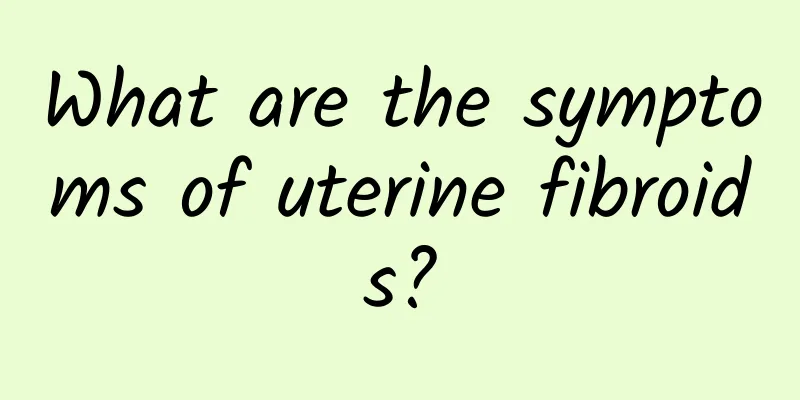What are the symptoms of uterine fibroids?

|
Symptoms of uterine fibroids mainly include irregular menstruation, excessive menstrual flow, prolonged menstruation, abdominal mass, abdominal pain, backache, and lower abdominal distension. In severe cases, uterine fibroids may also lead to infertility, miscarriage, premature birth, and other problems. The cause of uterine fibroids is still unclear, but it may be related to long-term excessive estrogen stimulation. The symptoms of uterine fibroids mainly include the following aspects: 1. Abdominal mass: As the fibroids grow, an obvious mass may appear in the abdomen and may move. 2. Abdominal pressure: The enlargement of fibroids may put pressure on surrounding organs and cause abdominal pressure. 3. Menstrual abnormalities: such as shortened menstrual cycle, increased menstrual flow, prolonged menstrual period, etc. 4. Anemia: Increased menstrual volume or long-term excessive menstrual volume may lead to anemia, fatigue, palpitations and other symptoms. 5. Increased vaginal discharge: The enlargement of fibroids may lead to an increase in the area of the uterine cavity and increased secretions of endometrial glands, causing an increase in vaginal discharge. 6. Frequent urination, urgency, and urinary retention: The enlargement of fibroids may compress the bladder, leading to symptoms such as frequent urination and urgency. In severe cases, urinary retention may occur. 7. Constipation: The enlargement of fibroids may compress the rectum and cause symptoms such as constipation. 8. Lower abdominal pain: The enlargement of fibroids may cause lower abdominal pain, especially when the fibroids undergo degeneration. 9. Infertility: Uterine fibroids may affect the implantation of fertilized eggs, leading to infertility. The above are common symptoms of uterine fibroids, but not all symptoms will appear. If the above symptoms occur, it is recommended to seek medical attention in time for early treatment. At the same time, maintaining good living habits and eating habits can also help prevent the occurrence of uterine fibroids. |
<<: What does premature ovarian failure mean?
>>: Conventional methods of Western medicine for treating amenorrhea
Recommend
Will cervical erosion recur after recovery?
Will cervical erosion recur after recovery? Cervi...
What are the dangers of multiple miscarriages? Let's take a look
Generally speaking, multiple miscarriages can eas...
There are many good ways to prevent adnexitis in life
As a common gynecological disease, adnexitis will...
What are the misunderstandings in the treatment of vulvar leukoplakia
Vulvar leukoplakia is common in female patients. ...
Body Sculpting Tutorial - Slimming Arms and Triceps Stretch
The hot summer is here, and many girls have throw...
To lose weight, you need to eat more starch. Resistant starch does not make you fat.
Who said "You can't eat starch when losi...
How to maintain premature ovarian failure to recover
Premature ovarian failure may be improved through...
Several common symptoms of vaginal candidiasis
It is understood that many female friends suffer ...
Brown rice and purple rice are rich in dietary fiber. Which one is a better alternative to white rice? Nutritionist reveals: These two types of people should not eat
People who like to eat can focus on brown rice, b...
Why do women need to undergo gynecological examinations before having an abortion? Women must know these common sense before having an abortion
Before having an abortion, many women feel uncomf...
What to do if you have irregular menstruation after childbirth
What should I do if I have irregular menstruation...
Can I exercise normally if I have vaginal candidal infection?
Can you exercise normally if you have vaginal can...
Ovulation bleeding and urinary discomfort
Ovulation bleeding accompanied by urinary discomf...
Sitting for long periods of time may cause cervicitis
Sitting for a long time may induce cervicitis, be...
What damage will happen to the uterus after miscarriage?
Uterine abortion may cause some degree of damage ...









